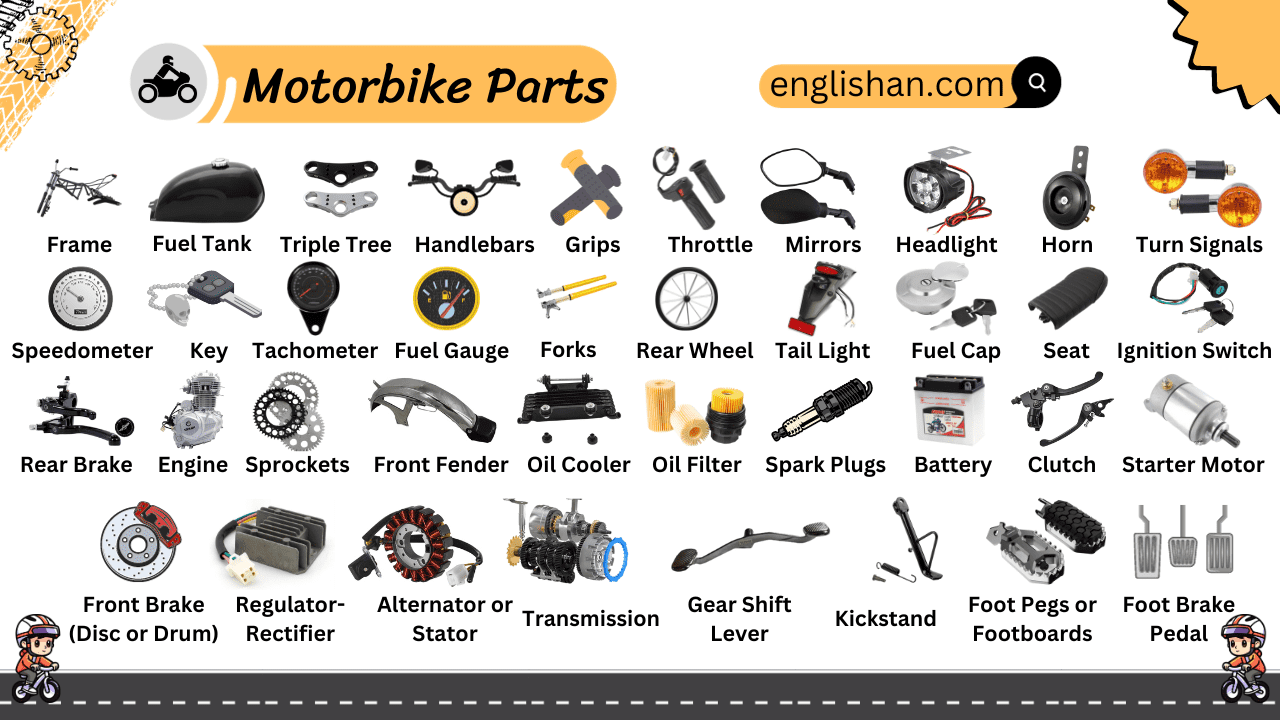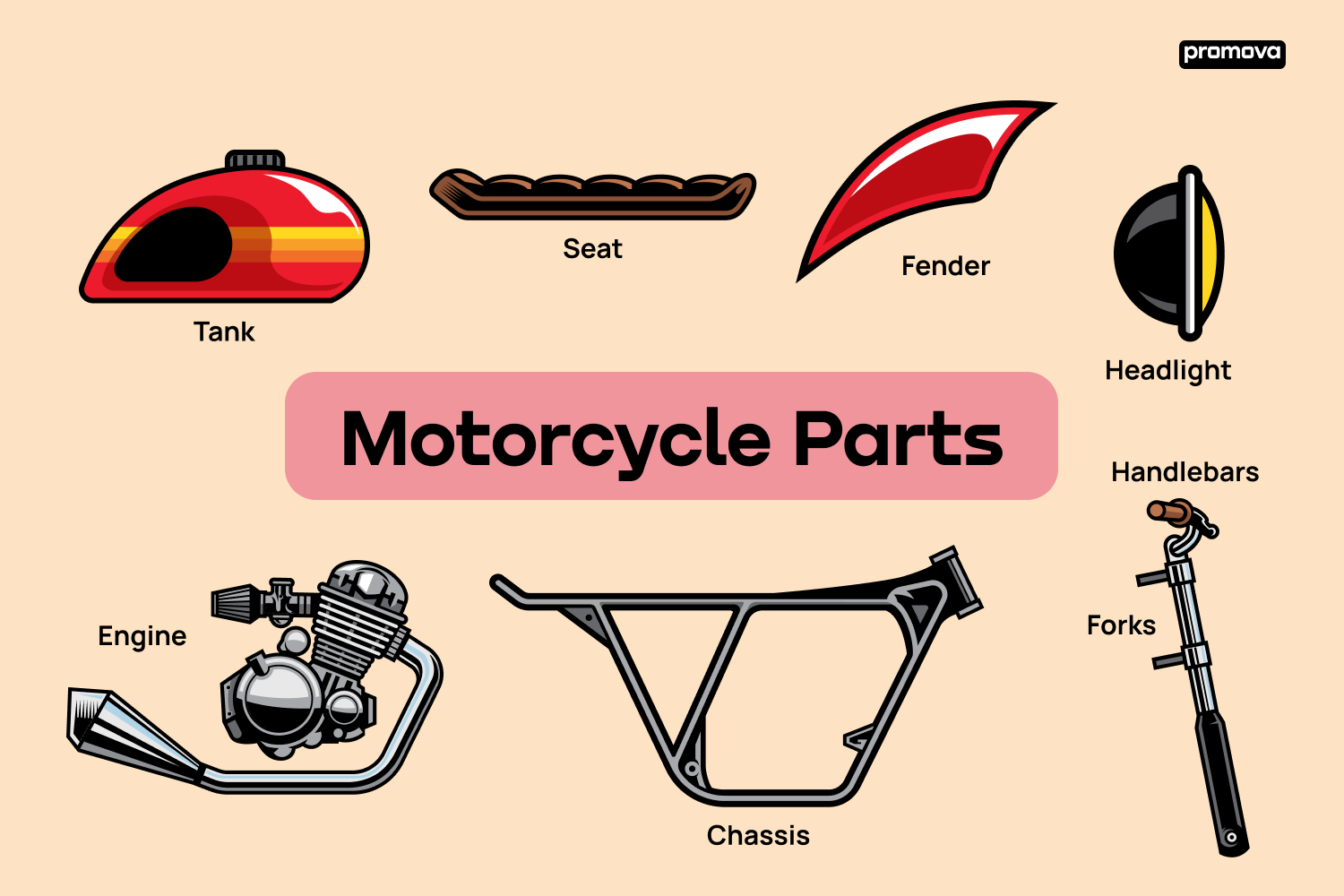Mechanic Advice on Maintaining Durable Bike Parts Wellington
Mechanic Advice on Maintaining Durable Bike Parts Wellington
Blog Article
Discover the Essential MotorBike Parts You Need for Ideal Performance
Understanding the important parts of a motorcycle is fundamental for achieving peak performance. Each part, from the engine to the braking system, plays a vital duty in overall performance and safety and security. Routine upkeep can avoid unanticipated failures and improve the riding experience. Numerous motorcyclists overlook the complexities of these systems. Uncovering how they interact can bring about an extra reliable experience. What critical parts should every rider focus on?
The Engine: The Heart of Your Bike
The engine serves as the core element of a motorbike, driving its performance and specifying its capacities. It is accountable for transforming fuel right into mechanical power, which powers the bike forward. Various sorts of engines are employed, consisting of single-cylinder, V-twin, and inline arrangements, each offering distinctive qualities matched for different riding styles and objectives. The engine size, generally determined in cubic centimeters (cc), significantly influences performance, with larger engines normally providing even more power and torque.Furthermore, the engine's design and innovation, such as gas injection systems or air-cooling versus liquid-cooling, affect performance and integrity. Maintenance is essential for peak operation; aspects like routine oil changes and checking stimulate plugs warranty durability. Bikers frequently consider an engine's responsiveness and smoothness, as these qualities enhance the total riding experience. Inevitably, the engine continues to be a critical aspect that defines not only the motorbike's efficiency yet likewise the biker's connection to the machine.
The Transmission: Changing Gears Efficiently
The transmission plays a necessary role in a motorbike's performance, especially in the mechanics of gear changing. Understanding how to move equipments efficiently can improve the general riding experience, while normal upkeep guarantees peak capability. Appropriate focus to these facets can significantly influence the long life and performance of the motorbike.

Gear Shifting Mechanics
Smooth equipment shifting is crucial for perfect motorbike efficiency, considerably affecting both acceleration and control. The mechanics of gear moving include the communication between the clutch, gear bar, and transmission system. When a motorcyclist involves the clutch, it disengages the engine from the transmission, enabling for a gear modification without damaging the elements. A well-timed release of the clutch, incorporated with specific movement of the equipment bar, assists in a seamless change in between equipments. This process assures that the engine operates within its finest power band, enhancing performance. Motorcycle Spares Christchurch. In addition, recognizing the gear proportions and their impact on rate and torque can aid bikers make notified choices throughout changes, inevitably adding to a more satisfying and responsive riding experience
Upkeep Tips Relevance
Routine maintenance plays a crucial role in guaranteeing that the transmission system operates successfully, permitting smooth equipment changes. Frequently checking and transforming the transmission fluid is vital, as old fluid can result in raised rubbing and wear. Additionally, inspecting the clutch for wear guarantees peak engagement and disengagement, protecting against slippage throughout gear modifications. Lubrication of relocating parts is just as crucial to lower rubbing and enhance performance. Motorcycle proprietors should also monitor for leakages and unusual noises, as these can show underlying problems. By adhering to these maintenance ideas, cyclists can prolong the life-span of their transmission system, assuring that equipment shifts remain seamless and adding to the total efficiency of their motorcycle.
The Braking System: Ensuring Security on Every Adventure
Braking systems are essential components that directly influence a motorcycle's safety and security and efficiency. They include different parts, consisting of brake pads, blades, calipers, and hydraulic lines, all collaborating to ensure reliable deceleration. The kind of braking system-- commonly either disc or drum-- influences responsiveness and stopping power.Regular maintenance is vital to copyright peak efficiency; worn brake pads can result in lowered performance and raised quiting distances. Furthermore, the top quality of brake fluid should be kept track of, as it can absorb moisture over time, endangering braking efficiency.Riders need to likewise consider the value of anti-lock stopping systems (ABDOMINAL MUSCLE), which stop wheel lockup throughout abrupt quits, boosting general security. Correctly working brakes are not just about stopping; they instill confidence in the motorcyclist, allowing for safer navigating with various surfaces. Eventually, a dependable braking system is crucial for delighting in every ride with comfort.
The Suspension: Enhancing Convenience and Control
A well-functioning suspension system substantially adds to a motorbike's general performance, matching the performance of the stopping system. The suspension plays a significant duty in taking in shocks from uneven surface areas, guaranteeing a smoother trip while keeping tire call with the road. This get in touch with is necessary for both security and control, enabling motorcyclists to browse edges with confidence and precision.Different sorts of shock absorber, such as telescopic forks or mono-shocks, offer differing levels of comfort and handling. Effectively tuned suspension improves responsiveness, providing the motorcyclist with an extra linked feel to the motorbike. Routine maintenance checks are important to identify the suspension components, including dampers and springs, are functioning at their finest. An efficient shock absorber not only raises the riding experience however also adds to the longevity of various other motorbike parts by reducing deterioration. Consequently, investing in quality suspension is crucial for any severe motorcycle lover.
The Tires: Attaching You to the Roadway
Tires play a crucial role in a motorbike's performance, serving as the main web link between the roadway and the biker. Comprehending the different kinds of tires offered can significantly influence taking care of and safety. Additionally, regular upkeep is essential to guarantee peak tire performance and durability.
Tire Types Explained
Just how do different tire types influence a motorcycle's efficiency? Tire types play a crucial duty in figuring out a motorcycle's handling, stability, and grip. Sport tires, created for high performance, deal improved traction and responsiveness on smooth roads, making them perfect for racing and hostile riding. On the other hand, visiting tires focus on durability and convenience, providing a smoother experience for long-distance traveling. Off-road tires, characterized by their tough walk patterns, stand out in grip on unpaved surface areas, ideal for experience lovers. Furthermore, dual-sport tires mix characteristics from both on-road and off-road classifications, accommodating visit flexible riding requirements. Eventually, selecting the appropriate tire kind is essential for maximizing efficiency, guaranteeing safety and security, and boosting the total riding experience.
Maintenance Tips Offered
While riding when driving, preserving ideal tire problem is vital for safety and security and efficiency. Regularly inspecting tire pressure is very important, as under-inflated tires can result in bad handling and increased wear. It is advisable to evaluate walk deepness often; used tires compromise grip and stability. On top of that, bikers need to try to find indications of damage, such as splits or bulges, helpful resources which can suggest the need for replacement. Rotating tires regularly assures also use, boosting durability. Keeping tires tidy from debris and preventing excessive visuals can lengthen their lifespan. Keeping correct positioning and balance contributes to peak efficiency, minimizing stress on other bike parts. Complying with these upkeep suggestions will significantly improve the overall riding experience.
The Fuel System: Sustaining Performance and Efficiency
The fuel system plays a vital duty in taking full advantage of a motorbike's efficiency and efficiency, as it ensures the optimal delivery of gas to the engine. It comprises numerous critical components, consisting of the gas container, gas pump, gas filter, and fuel injectors or carburetor. Each part has to work efficiently to assure a smooth and effective ride.The fuel tank stores gas and provides it to the engine by means of the gas pump, which generates the necessary pressure. A gas filter stops contaminants from entering the engine, while the injectors or carburetor mix gas with air for combustion.Proper upkeep of the gas system is essential; a blocked filter or malfunctioning injector can lead to decreased performance and boosted gas usage. By confirming that the fuel system operates efficiently, riders can appreciate improved throttle reaction, much better fuel economic climate, and on the whole boosted riding experience.
The Electrical System: Powering Your Trip
A reliable electric system is important for the general capability and safety and security of a motorbike, as it powers important elements such as the ignition, lighting, and different electronic systems. This system consists of the battery, which stores power, and the generator, responsible for creating power while the engine runs. The wiring harness connects these elements, making certain trustworthy power distribution.Additionally, merges shield the system from overloads, while relays aid control high-current gadgets with low-power signals. A well-kept electrical system boosts performance by guaranteeing smooth begins and regular procedure of lights and signals, vital for cyclist exposure and safety.Regular checks of the battery's cost and links are necessary for stopping electrical failures. Riders need to also evaluate wiring for wear and tear, ensuring all parts function preferably. Eventually, a robust electrical system contributes considerably to the overall efficiency and dependability of the motorbike.
Frequently Asked Concerns
Just how Commonly Should I Replace My Bike's Battery?
The regularity of motorbike battery substitute relies on usage and maintenance (Motorcycle Parts Auckland). Normally, batteries need to be replaced every three to five years. Routine checks can help determine when a substitute is needed for peak performance
What Devices Do I Required for Fundamental Motorbike Upkeep?
For fundamental bike upkeep, one calls for essential tools such as a socket collection, wrenches, screwdrivers, pliers, tire pressure gauge, and a torque wrench. These tools help with effective maintenance and ensure the motorcycle runs efficiently and safely.
Just How Can I Improve My Motorbike's Aerodynamics?
To boost motorbike aerodynamics, one must think about changing her latest blog fairings, making use of windshield extensions, maximizing body position, and decreasing total weight. These adjustments aid reduce drag, enhancing security and gas performance during adventures.
What Are the Indicators of a Failing Electrical System?
Indications of a falling short electrical system consist of dimming lights, difficulty starting, irregular tool readings, and blown merges. Bike Parts Wellington. Unusual smells or rust around battery terminals may likewise show underlying issues needing instant attention for security and efficiency

Exactly how Do I Choose the Right Oil for My Bike?
When selecting oil for a motorbike, one need to take into consideration the maker's specifications, thickness scores, and the kind of riding. In addition, traditional versus artificial oil can influence performance and engine security, affecting the decision substantially. The engine size, generally measured in cubic centimeters (cc), significantly affects efficiency, with bigger engines usually giving even more power and torque.Furthermore, the engine's style and technology, such as fuel injection systems or air-cooling versus liquid-cooling, impact performance and dependability. A well-functioning suspension system greatly contributes to a motorbike's general performance, enhancing the efficiency of the braking system. The fuel system plays an important function in maximizing a motorbike's efficiency and efficiency, as it guarantees the optimal delivery of gas to the engine. A gas filter protects against pollutants from entering the engine, while the injectors or carburetor mix fuel with air for combustion.Proper maintenance of the gas system is critical; a clogged filter or malfunctioning injector can lead to lowered efficiency and boosted gas consumption. A properly maintained electric system boosts efficiency by ensuring smooth begins and regular operation of signals and lights, essential for biker presence and safety.Regular checks of the battery's charge and connections are vital for stopping electric failings.
Report this page